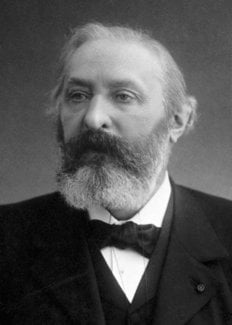Sully Prudhomme
Biographical

Rene Francois Armand Prudhomme (1839-1907) was the son of a French shopkeeper. He wanted to become an engineer, but an eye disease terminated his training at a polytechnic institute. He studied literature, and after a brief and unsuccessful interlude in industry, he took up law, though without much conviction, and worked in a solicitor’s office. Sully Prudhomme was a member of the «Conference La Bruyère», a distinguished student society, and the favourable reception that his fellow members gave to his juvenilia encouraged him to go on writing poetry. His first volume, Stances et Poèmes (1865) [Stanzas and Poems], was well reviewed by Sainte-Beuve and established his reputation. Sully Prudhomme combined a Parnassian regard for formal perfection and elegance with philosophic and scientific interests, which are revealed, for instance, in his translation of the first book of Lucretius’ De Rerum Natura (1878-79). Some of his other poetic works are: Croquis Italiens (1866-68) [Italian Notebook]; Solitudes (1869); Impressions de la guerre (1870) [Impressions of War]; Les Destins (1872) [Destinies]; La Révolte des fleurs (1872) [Revolt of the Flowers ]; La France (1874); Les Vaines Tendresses (1875) [Vain Endearments]; La Justice (1878); and Le Bonheur (1888) [Happiness]. Les Epaves (1908) [Flotsam], published posthumously, was a collection of miscellaneous poems. A collected edition of his writings in five volumes appeared in 1900-01. He also wrote essays and a book on Pascal, La Vraie Religion selon Pascal (1905) [Pascal on true Religion]. Sully Prudhomme was a member of the French Academy from 1881 until his death in 1907.
This autobiography/biography was written at the time of the award and first published in the book series Les Prix Nobel. It was later edited and republished in Nobel Lectures. To cite this document, always state the source as shown above.
Sully Prudhomme died on September 7, 1907.
The Nobel Foundation's copyright has expired.Nobel Prizes and laureates
Six prizes were awarded for achievements that have conferred the greatest benefit to humankind. The 12 laureates' work and discoveries range from proteins' structures and machine learning to fighting for a world free of nuclear weapons.
See them all presented here.
